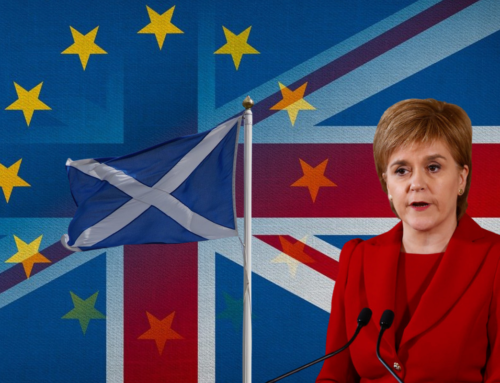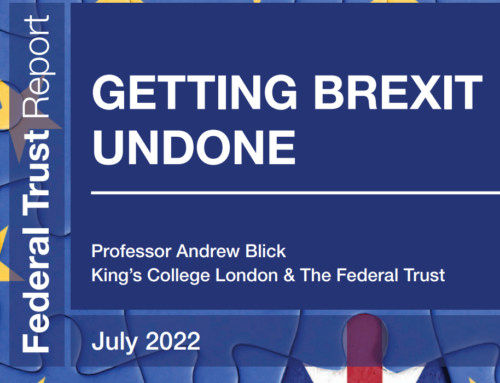A weakened Prime Minister
It is significant and appropriate that the Conservative MPs who voted on 15th January against the Prime Minister’s Withdrawal Agreement from the European Union should have been drawn from opposing wings of her Party. While the majority of her internal opponents came from the European Research Group, some came from a very different part of the political spectrum, like Dominic Grieve and Justine Greening, who favour a new referendum with the option to remain in the EU. The 2016 referendum was largely a product of divisions within the Conservative Party and the conduct of the Brexit negotiations has been dominated by the internal manoeuvrings within the Party. The Prime Minister’s attempts to please everyone within her fractious Party during the Brexit negotiations have ended up pleasing very few Conservative MPs outside the ranks of her government, members of which are bound to support her in a public vote.
ERG satisfaction
Of the two wings of the Conservative Party mentioned above, the ERG and its allies have perhaps more reason for satisfaction in the short term. Many of these MPs actively favour leaving the EU in as dramatic and abrupt a fashion as possible. Acceptance of the Prime Minister’s Withdrawal Agreement would have largely precluded any such outcome. Other Conservative MPs are prepared to leave the EU without any Withdrawal Agreement but believe that UK intransigence in the coming weeks may still obtain significant further concessions from the EU before the end of March. Some of these even claim that the Prime Minister’s negotiating hand in Brussels will have been strengthened by the severity of her Parliamentary defeat. This seems fanciful but it is difficult to disagree with the general proposition that such a brutal rejection of the Prime Minister’s proposed agreement, which is one significant alternative to a non-consensual Brexit, makes a “no deal” Brexit considerably more likely than it was at the beginning of the week. The workings of Article 50, with the UK automatically leaving the EU on 29th March, continue unabated until decisions are taken to arrest or slow them. The rejection of the Withdrawal Agreement does not constitute such a decision.
To many MPs and commentators the above may well seem an incomplete analysis. They will point rightly to the very clear majority within the House of Commons, consisting of all the Opposition Parties and at least a significant minority of the Conservative Party, that rejects entirely the notion of Brexit without a Withdrawal Agreement. Much early comment has depicted the Prime Minister’s devastating defeat as an opportunity for Parliament to reassert itself. A Parliament reasserting itself will surely not allow the UK to “crash out” of the EU on 29th March. It would be strange indeed if Parliament were unable over the next two months to contrive one or other of the alternatives to a catastrophic Brexit on auto-pilot.
The whole saga is, however, one littered with strangeness. The Prime Minister’s humiliating defeat on 15th January was followed on 16th January by successful resistance to a Motion of no Confidence in her government put down by the Labour Party. In this successful resistance, the Prime Minister was supported by all those Conservatives, from whatever wing of the Party, who voted against her Withdrawal Agreement. The remarkable contrast between the votes of Conservative MPs scornfully rejecting on one day the flagship policy of their Prime Minister and on the following day happily expressing their confidence in her as leader of the country, should give pause to those concluding prematurely that Parliament is easily capable of “taking control” of the Brexit negotiations, and thereby preventing a catastrophic Brexit. The British constitutional system imposes considerable limits on the capacity of Parliament to exercise control over a government when that government can be confident that it will not be voted out of office by MPs. A number of factors combine in the case of Brexit to ensure that it will be particularly difficult for Parliament to impose its will on Theresa May’s government. As Prime Minister, Theresa May has anyway shown little inclination for constructive dialogue with other parties in Parliament or with the devolved administrations.
Is there an alternative?
There is force in the argument of some in Theresa May’s cabinet that there is not and perhaps cannot be any unified Parliamentary will on Brexit to which the government should bow. Some of her opponents want to scrap Brexit altogether; some want a “softer” form of Brexit; others want a second referendum; still others wish to eliminate the Irish backstop; yet others want a General Election as a prelude to further negotiations on the Withdrawal Agreement. Simple opposition to “no deal” is not, however, in the circumstances of Article 50, an implementable policy. There needs to be a concrete alternative before Parliament can exercise in any meaningful way effective pressure on the government. Until now, no such concrete alternative has gained general support among Parliamentarians. The hesitations and ambiguities of Labour policy on Brexit have played an important role in preventing such consensus.
It is not impossible that in the coming days the Parliamentary Labour Party may, responding to pressure from its members and potential voters, come to support what intuitively seems the most likely point of consensus among those hostile to “no deal” and opt for a new referendum, a People’s Vote. With Labour support, a further referendum, particularly one with “remain” as the alternative to the Prime Minister’s Withdrawal Agreement, would be likely to give enough of what they want to enough MPs from all parties to have a reasonable chance of mobilising a Parliamentary majority behind it. Without unambiguous Labour support, the chances of a further referendum are much diminished, perhaps eliminated. But even with an emerging Parliamentary majority in favour of a People’s Vote, the path towards ensuring that it happens will not be straightforward.
What are the practicalities?
It is generally recognised that it would be impossible now to hold a referendum before the scheduled date of Brexit (29th March). For the referendum to have meaning, there would need to be an extension of the two-year negotiating period foreseen in Article 50 of the Lisbon Treaty. This extension would probably be granted by the EU but it is very difficult to imagine Theresa May’s government asking for such an extension for such a reason: it would be a matter of high and time-consuming legal controversy whether and how Parliament could compel it to do so. A further twist might well be given to the already tangled knot of constitutional controversy that surrounds Brexit if the present government, as it might well do, refused Parliamentary pressure to ask for the necessary extension, claiming perhaps as justification the original Parliamentary approval of the Article 50 notification in 2017, which envisaged Brexit by 29th March 2019 at the latest.
It will be clear from the above that if Parliament is to prevent a “no deal” Brexit other than by accepting the Prime Minister’s Withdrawal Agreement, it must rapidly agree on an alternative course of action. A People’s Vote has much to commend it as this alternative. Parliament will then, however, have seriously to ask itself whether and how it can compel this government to implement a new referendum in good time and in good faith. The Prime Minister will be well aware that a People’s Vote, particularly one that led to the abandonment of Brexit, might well destroy the Conservative Party. It is likely that she will use the considerable legal and political resources given in the UK to a government enjoying a Parliamentary majority to frustrate the Vote’s occurrence. The perceived interests of her Party have always played a determining role in the Prime Minister’s approach to the Brexit negotiations and there is no reason to believe that will change in the coming weeks.
Her calculation may well be that by late February or early March the House of Commons will have been unable to agree on a specific alternative to her proposed Withdrawal Agreement (or something like it) and that even if one exists she will be able to use the powers of government to neuter its implementation. She will then have achieved in yet more pressing circumstances than today a final binary choice between her Agreement and “no deal.” If that is the case then that majority of MPs hostile to leaving with “no deal” would find themselves left with no realistic alternative but the Prime Minister’s Agreement.
Parliament has options
It is certainly open to Parliament over the coming weeks to take steps to generate a genuine alternative to “no deal”. But this alternative will not create itself and once created may well face concerted governmental opposition. The task for Parliament therefore over the coming days and at most weeks is to create a consensus behind this new alternative, almost certainly a People’s Vote, but possibly outright revocation of the Article 50 notification; and then to work out a realistic path for ensuring that the government carries this alternative out. It may well be that the present government, for reasons of internal Party management, is incapable of following the wishes of MPs on this matter. The House of Commons must then stand ready to form a new government, not through a General Election, but from its existing ranks. There is no time for a probably indecisive General Election, and a national government in place for six months would be an entirely appropriate instigator of a new national consultation (see previous blog on this topic: Brexit: A national government or “no deal”). It will not be enough for Parliament to wish the end of averting a “no deal” Brexit. It must wish and carry out the means as well.







